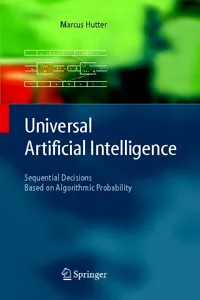Universal Artificial Intelligence

This book presents sequential decision theory from a novel algorithmic information theory perspective. While the former is suited for active agents in known environments, the latter is suited for passive prediction in unknown environments.
The book introduces these two well-known but very different ideas and removes the limitations by unifying them to one parameter-free theory of an optimal reinforcement learning agent embedded in an arbitrary unknown environment. Most if not all AI problems can easily be formulated within this theory, which reduces the conceptual problems to pure computational ones. Considered problem classes include sequence prediction, strategic games, function minimization, reinforcement and supervised learning. The discussion includes formal definitions of intelligence order relations, the horizon problem and relations to other approaches to AI.
One intention of this book is to excite a broader AI audience about abstract algorithmic information theory concepts, and conversely to inform theorists about exciting applications to AI.
The book introduces these two well-known but very different ideas and removes the limitations by unifying them to one parameter-free theory of an optimal reinforcement learning agent embedded in an arbitrary unknown environment. Most if not all AI problems can easily be formulated within this theory, which reduces the conceptual problems to pure computational ones. Considered problem classes include sequence prediction, strategic games, function minimization, reinforcement and supervised learning. The discussion includes formal definitions of intelligence order relations, the horizon problem and relations to other approaches to AI.
One intention of this book is to excite a broader AI audience about abstract algorithmic information theory concepts, and conversely to inform theorists about exciting applications to AI.
| Category : | Books |
| Year : | 2005 |
| Submitted : | 6th, August 2008 |



